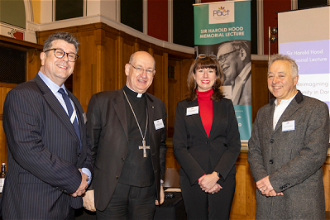Scottish Bishops: Assisted suicide attacks human dignity

Anthony Horan - ICN screenshot
Source: SCMO
In a submission to the consultation on assisted suicide proposed by Liam McArthur MSP, Scotland's Catholic bishops have opposed the proposed law as an attack on human dignity which will undermine efforts to prevent all suicides, damage public trust in doctors and leave frail, elderly and disabled people feeling they are a burden on society.
The church response was submitted to the consultation by Anthony Horan, Director of the Catholic Parliamentary Office, who commented: "Assisted suicide attacks human dignity and is based on the mistaken belief that individuals can lose their value and worth. The state should support the provision of care, not the deliberate killing, of those at the end of life."
Mr Horan added: "Apart from the fact that Assisted suicide undermines efforts to prevent suicide and sends a message that suicide is sometimes appropriate it sends a clear message to frail, elderly and disabled Scots about the value that society places on them and puts pressure on them to end their lives for fear of being a financial, emotional or care burden on others. This is intolerable and utterly wrong.
"No matter how well intentioned the safeguards are, it is impossible for any government to draft assisted suicide laws which include legal protection from future expansion of those laws. The slippery slope is real and dangerous. MSPs should be preventing suicide, not assisting it by introducing a dangerous law with deadly and irreparable consequences."
A full summary of the Catholic Church concerns is shown below:
Assisted suicide attacks human dignity and is based on the mistaken belief that individuals can lose their value and worth. The state should support the provision of care, not the deliberate killing, of those at the end of life.
Assisted suicide undermines efforts to prevent suicide and sends a message to society that suicide is an appropriate response to physical or mental suffering.
Suicide prevention efforts rightly affirm that everyone's life matters and every life has value, assisted suicide says that sometimes suicide is an appropriate response to an individual's circumstances, worries and anxieties, and that governments should support and facilitate it.
It would be absurd for society to support suicide prevention strategies on one hand, and to permit state-assisted suicide on the other.
Assisted suicide sends a clear message to frail, elderly and disabled people about the value that society places on them and puts pressure on them to end their lives for fear of being a financial, emotional or care burden on others.
In Oregon, in 2020, over half of patients (53%) listed "being a burden" as a reason to end their lives (Oregon Death with Dignity Act 2020 Data Summary). This suggests that society is failing those most in need of help and support in our communities, resulting in elderly and vulnerable people feeling immense pressure to end their lives to lessen the impact on family, friends, carers, and even the state. In such situations the option of assisted suicide becomes less about having a 'right' to die and more about feeling the full weight and expectation of a 'duty' to die. When the elderly express concerns about being a burden, the appropriate response is not to suggest that they have a duty to die; rather, it is to commit to meeting their needs and providing the care and compassion to help them live.
If Scotland establishes death on demand as normal practice, it can easily become a cultural expectation for the elderly, the lonely, and the vulnerable.
Assisted suicide undermines public trust in doctors, damaging the doctor-patient relationship.
The 'option' of assisted suicide completely alters the doctor-patient dynamic and the wider provision of care in a deeply troubling way. In a society where assisted suicide is legal, care for life can no longer be considered an unqualified principle underpinning the provision of healthcare. Deliberately bringing about a patient's death would be akin to crossing the Rubicon for a profession entrusted to act in the best interests of the patient and to first do no harm.
Evidence is growing of the significant pain and indignity caused by assisted suicide.
The bishops cited a number of experts who have called into question the claim that assisted suicide is a compassionate, painless and dignified death.
Assisted suicide undermines efforts to improve palliative care.
The proposal to legalise assisted suicide, bluntly, provides a quick, cheap alternative to good palliative care. Mr McArthur's proposal chillingly concedes that it is cheaper to end life than to provide care (see footnote 124, page 28 of the consultation document).
Rather than increasing options at the end of life as proponents would wish us to believe, these proposals actually appear to limit people's options when they are at their most vulnerable. In Canada, less than half of patients who participate in assisted suicide or euthanasia see a specialist palliative care team, and only 15 per cent of Canadians have access to publicly funded palliative care at home (Munro C, Romanova A, Webber C, Kekewich M, Rayelle R, Tanusepurto P. Involvement of palliative care in patients requesting medical assistance in dying. Canadian Family Physician, 220; 66: 833-42 and Access to Palliative Care in Canada. Ottowa: Canadian Institute for Health Information, 2018, p6).
No matter how well intentioned the safeguards are, it is impossible for any government to draft assisted suicide laws which include legal protection from future expansion of those laws. The slippery slope is real and dangerous. Mr McArthur's proposals would have a profoundly negative effect on the elderly and disabled, rendering lives less valuable and less worthy, and deepening inequalities.
Finally, given that the consequences of the decision to request assisted suicide are deadly and irreparable it is clear that a law legalising assisted suicide is extremely high risk. MSPs, who will ultimately be responsible for introducing such a law, ought to think very carefully about the significance and consequences of their decision; a decision which will have far-reaching consequences, especially for the sick, the disabled, the elderly, the lonely and the most vulnerable.
LINK
Scottish Catholic Media Office: www.scmo.org


















